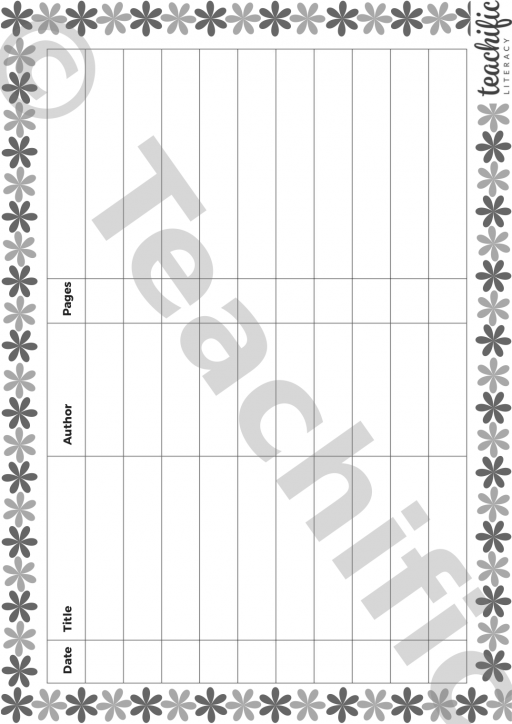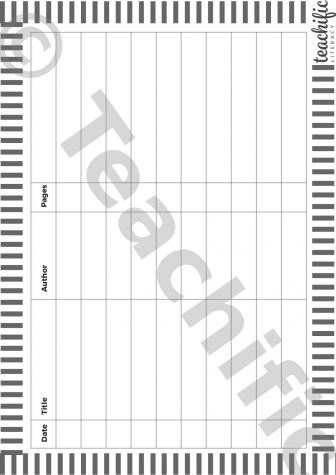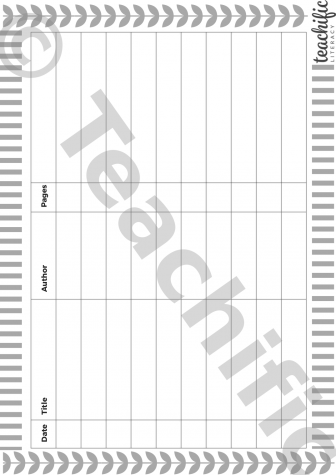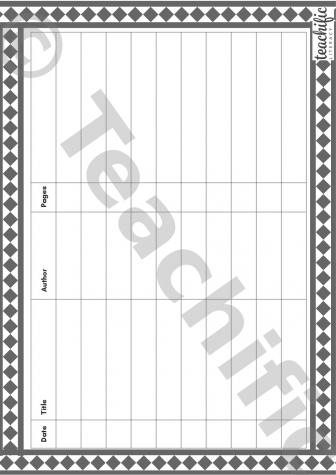About this teaching resource
Reading Logs rate as yet another one of my favourite reading tools, that incidentally happen to live very happily within another of my favourite tools, Reading Journals.
Nancy Pearl, librarian extraordinaire and book advocate speaks my language. ‘There are only two regrets I have about a life devoted to reading. […] Regret number two is that I never kept track of the books that I have read.
Well, I have kept a very sporadic diary of the books I have read and I love looking back on this list. My own children haven’t kept a list, but their bookshelves are lined with the significant books in their lives, books that are discussed often and reread frequently.
Reading Logs are a simple but powerful tool for Year 3-6 students to keep a track of their school reading experiences, a record that to us may seem laborious, when in fact it represents a great journey for a child. A two-minute time slot after reading is all it takes. It’s another example of a cheap, cheerful, totally underutilised and easy to set up routine.
I have students:
- Record their reading daily at school: it marks the daily school reading achievement of a child.
- We don’t wait until a book is finished, because only recording when a book is finished means that for some children that record is never made. For this very reason, the daily entry is daily recognition for the child, a sign of the effort made, the importance of the daily time committed to reading.
- For the teacher, the daily record, easily scanned on a regular basis, provides an insight to what each child is reading, how they are progressing with that reading, what stamina they have for the text or if indeed they are abandoning books on a frequent basis.
- I also have students bring their Reading Logs to reading conferences, so we can look at this reading record.
- They also make an appearance at parent teacher interviews and prompt incredible reading reflections that I have students write on occasion.
I read with interest that many teachers, parents and researchers have found home reading logs to reduce student engagement with reading. I have found, that when reading logs are included as part of the reading culture and climate that I craft for readers at school I am sending the message that the most important thing about being a reader and growing as a reader is by reading every day.
That’s why reading time is carved out every day, following a Mini Lesson or a Read Aloud, and bookended with a Book Chat or a class share, or some other opportunity to talk about reading. That’s why the Reading Log has such value. It is a record of something so important to the child’s reading development: they are a reader and they love it.
Reading Log Features:
- Date
- Title
- Author
- Pages – have students record the page numbers as in pp34-45. This can help them remember where they’re up to as well as seeing themselves powering through the book by page numbers.
- When they finish the book, I get them to colour the pages box on that day. This is a simple visual for books completed.
- Final column: Some Reading Logs have prompts included. This can serve as a prompt for jotting thoughts and ideas that might be used for Reading Journals or Book Chats. I like that it also reinforces to readers that the thinking they are doing along the way is important and highly valued.
- Many readers get the message that the only thinking they need to do is after they have finished reading (which comes when readers are given a passage or short text to read and then asked to answer set questions).
- Good readers are thinking, talking about, questioning and wondering all through the book. What an amazingly rich and unbelievable amount of learning that may never be acknowledged or caught.
Reviews
There are no reviews for this resource yet, why not write one?
Report a problem
Please log in to report a problem with this resource
Want this teaching resource?
Members get great benefits such as FREE access to premium resources like this one, discounts on courses and more.
Download includes: PDF 1 pages 117 kb





